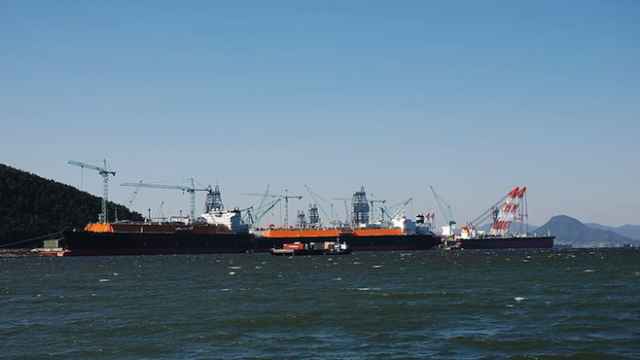Russia is diverting more of its crude oil east with deliveries to China hitting a new record last month at the expense of Europe as geopolitical tensions between Moscow and the West dictate the latest shift in flows.
As Russia's relations with the West deteriorated over the Ukraine crisis, the European Union and United States imposed wide-ranging sanctions on Russian firms, including oil and gas producers, leaving Moscow trying to forge closer ties with energy-hungry China.
Russia's Еnergy Мinistry says crude oil supplies to China surged in January-September by almost 45 percent year-on-year, to 16.8 million tons (450,000 barrels per day), while shipments from the Baltic Sea port of Primorsk plunged almost 20 percent to 33 million tons.
Oil product exports to Europe have been rising and plans for state-owned monopoly Transneft to use crude oil pipelines for exports of diesel show the trend will likely continue.
The decline in Russian crude oil exports comes as increasing volumes of crude oil are being processed at domestic refineries, reaching a post-Soviet high of almost 6 million tons in August as plants undergo a huge $55 billion modernization program.
"Much greater changes can be seen in the geographical distribution of these shrinking exports, with flows to the West clearly losing out against prioritized links to the Far East — a trend that could easily be accelerated further in the current political climate," JBC Energy consultancy said in a note.
Russia pumps more than 10 million barrels of oil a day, but most of its exports are sold in either the Mediterranean or northwest Europe at a discount to the benchmark Brent blend, which has long irked the cash-hungry Kremlin.
Analysts say it is more profitable for Russian companies to export processed oil products, such as diesel and fuel oil rather than crude oil. The modernization of Russian refineries has already eaten into the margins of European plants, as oil product exports from Russia to Europe have surged.
After Russian President Vladimir Putin inaugurated Russia's first oil terminal in Primorsk in 2001, Russia steadily increased crude oil exports, the windfall from which has shaped Russia's economy.
However, the trend reversed in 2011 due to shortages of fuel on the domestic market, when authorities encouraged companies to process crude oil. Exports of oil products doubled in 2003-2011.
Oil products are more profitable to export from Russia than crude oil. According to calculations, under current export duties for crude oil of $367 per ton, the export fee of the average basket of fuel oil, diesel and gasoline will stand at only $252 per ton.
More Oil to China
Russia supplies around 16 percent of its crude exports to Asia, and by 2035 aims to double that share to a third, despite the fact that it faces a lack of pipeline capacity.
"By diverting crude to Asia and cutting exports of straight-run fuel oil and vacuum gasoil, Russia will deprive European refiners of feedstock. By exporting growing amounts of ultra low-sulphur diesel, Russia will hammer refining margins (in Europe). Really, the candle is burning at both ends for Europe," said Andrew Reed, an analyst from the U.S.-based ESAI Energy consultancy.
To boost flows to Asia, Russia has sped up plans to expand ESPO's (East Siberia-Pacific Ocean) annual capacity to 80 million tons (1.6 million barrels per day) by 2020, 10 years earlier than initially envisioned. This target compares with ESPO's current capacity of about 1 million bpd and total Russian oil exports of around 4.4 million bpd.
A Message from The Moscow Times:
Dear readers,
We are facing unprecedented challenges. Russia's Prosecutor General's Office has designated The Moscow Times as an "undesirable" organization, criminalizing our work and putting our staff at risk of prosecution. This follows our earlier unjust labeling as a "foreign agent."
These actions are direct attempts to silence independent journalism in Russia. The authorities claim our work "discredits the decisions of the Russian leadership." We see things differently: we strive to provide accurate, unbiased reporting on Russia.
We, the journalists of The Moscow Times, refuse to be silenced. But to continue our work, we need your help.
Your support, no matter how small, makes a world of difference. If you can, please support us monthly starting from just $2. It's quick to set up, and every contribution makes a significant impact.
By supporting The Moscow Times, you're defending open, independent journalism in the face of repression. Thank you for standing with us.
Remind me later.






